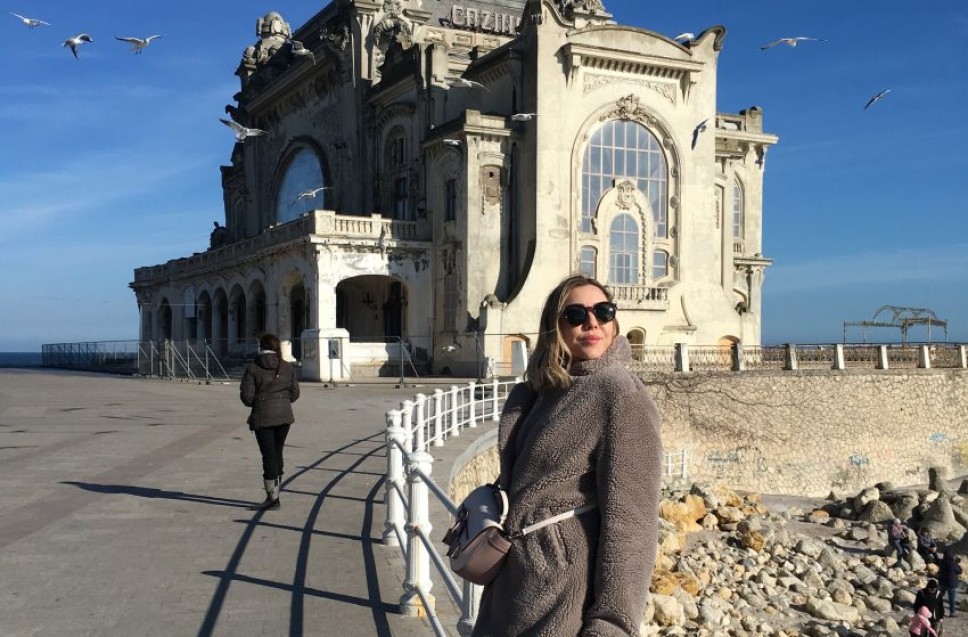Student of Maritime Faculty in Kotor about her Erasmus+ experience, making friends and connections that last

The possibility of spending one or two semesters at various European universities is only one of the advantages of the Erasmus Plus Exchange Programme. In this way, students are given a chance to learn new languages, expand their horizons, break free from national and cultural stereotypes, and on top of that, get a monthly scholarship in the amount of 900 euros. Jana Icevic from Bar is a graduate of the Maritime Faculty in Kotor of the University of Montenegro, and via Erasmus Programme, she finished semesters in Split and Romanian town Constance. She told her Erasmus experience for news Portal Bar.
She had a chance to learn about the advantages of the Erasmus Programme in the first year of studies in Kotor.
I decided to apply for the programme by a mere chance, after, Spiro Ivosevic, dean of the maritime faculty in Kotor, told me about it when I was a student representative of Maritime Management study programme. After his presentation, I searched for further information on the internet and asked students who already studied abroad via the Erasmus + programme about their experience.
She wanted to study abroad since the beginning of studies, therefore, she applied for the first Erasmus exchange immediately after the application calls were announced.
"Thus, in 2018 I was accepted by the University of Split, and that five-month semester of the second year I spent there. The next year I was accepted at University in Constance, but, unfortunately, after only four weeks, I had to return to Montenegro due to complicated situation caused by coronavirus," Jana said.
Applying for the programme is quite simple, our interviewee emphasizes.
"Application process consists of collecting and submitting documents such as CV, motivational letter, transcript of records, copies of personal documents, and certificates on language proficiency, as well as travel and health insurance," Jana recollects.
Time spent in Croatia made my student days brighter.
"I made friends with whom I'm still in contact. Students, faculty and dormitory staff, where I stayed, welcomed me at the very beginning. I met other students who were also on the Erasmus exchange from Europe. In a short time, I have become friends with foreign and local students and visited some places in the country. This is a very valuable experience for me, mostly because it is the first time I left my parent's home and stayed in the dormitory," Icevic says.
Split and its people will always remain in a fond memory.
"Split is a very beautiful town with an interesting history. It is definitely worth visiting. People from Split have a similar mentality as the ones from the seaside of our country, so I easily adapted to life in the town," Jana said.
She paid attention to the differences between Croatian and Montenegrin study models.
Professional practice that was held in classrooms and ships of Adrialine made my studying interesting. I managed to learn many things about communication on the ship. These classes were also held in classrooms with necessary simulators for practical learning. Grading system in Croatia is from 1 to 5, which is a bit different than the grades we got used to at the faculties in Montenegro. Also, class attendance is obligatory for regular students, just like in our elementary schools. Absence from classes leads to consequences such as a ban from taking exams. This is a difference comparing to our system because at our faculties attendance for some disciplines is not obligatory."
She especially liked the fact that Croatian study model gives a chance to have part-time jobs while studying
I think it would be very useful for faculties in Montenegro because I believe that students cannot work eight-hour shift and study at the university.
After a positive experience from Split, our interviewee decided to apply once again for the Erasmus Plus Programme. This time, she applied for the University in Constance, a well-know Romanian port town. Her application was accepted, but, due to coronavirus pandemic, she had to return to Bar after only four weeks.
My second Erasmus experience lasted shorter because the classes were banned due to pandemic. I was forced to prepare and take papers and midterms online from Montenegro. My stay in Constance, the city in Romania with access to the Black sea, ended after only 4 weeks. This time even 4 students travelled with for Romania. We were placed in a dormitory that was located within the faculty campus. Unfortunately, we didn't know what awaited us after only a month, we couldn't know that everything would end soon. For these reasons, we weren't able to visit other parts of Romania. Just as we started to get used to the life in the town, we had to return home, Jana said
The education system in Romania is slightly different than ours.
"Above all, schedule of subjects is different from the usual "week schedule". The schedule defines two weeks in advance. The lectures are interesting and challenging for me because it was held in English," says Jana and adds that she was happy to have an opportunity to get familiar with the culture of this part of Europe.
Student exchange is very important because, as our respondent says, in this way student can meet many people from different countries and get to know different cultures.
"They contribute to learning English as a basic language when it comes to communication between students. In Split, I studied in our language, while in the third year of studies, I had my first lectures in the English language. Taking into consideration that Erasmus + programme is financially supported, many students can get a chance to visit another European country," Jana Icevic concluded.

